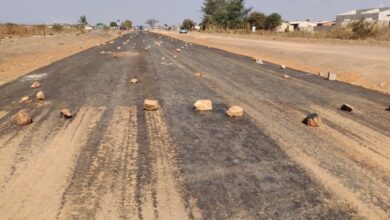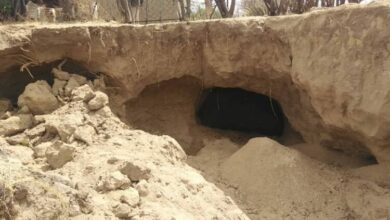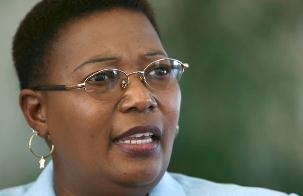INVESTIGATION: Chinese quarry mine unsettles Bulawayo residents amid bribery claims

Sithandekile Dube* is jolted by yet another heavy blast that just shook her house in Bulawayo’s Pumula North high-density suburb.
The blasts have become a common occurrence in the bustling neighbourhood after a Chinese firm, Hualin Investments (Pvt) Limited, set up a quarry mine in the suburb in 2021.
Hualin was given the nod to set up the quarry mine by the Bulawayo City Council (BCC) and the contract is valid for 10 years.
Investigations by CITE revealed that residents such as Dube, who are directly affected by the mining operations near Pumula High School, were not aware of the nature of the Chinese company’s operations prior to its licensing due to the alleged manipulation of the mandatory community consultations by bigwigs.
The residents, who now have to endure the noise pollution from the quarry site and the risk of having their properties damaged by the heavy blasts, say they suspect the Chinese circumvented Environmental Management Authority (EMA) processes after compromising some community leaders, including their councillor.
“It’s now a nightmare living here,” Dube said.
Patrick Ndlovu, a Pumula resident, said Hualin’s operations were shrouded in secrecy.
“The operations of the mining company are shrouded in secrecy and the local authority is seemingly untruthful to us on the matter,” Ndlovu said.
Council documents obtained by CITE showed that Hualin was initially given the nod to start operations on Stand 26102 in Pumula South on July 1, 2020, before it was moved to the new site in Pumula North under unclear circumstances.
The license was for an initial period of 10 years subject to review by the local authority.
Hualin’s monthly rentals were pegged at $5 000 per hectare, subject to a periodic review and an additional levy of $20 000 once a year.
Residents say the fees were too low given the risks posed by the quarry mining activities to the environment and their properties.
Khumbulani Maphosa, the coordinator of Matabeleland Institute for Human Rights (MIHR) coordinator, whose organisation is involved in environmental monitoring, said the Environment Impact Assessment (EIA) process for the mine was done during the lockdown to prevent the spread of Covid-19 and this meant that the affected residents were sidelined.
“The shifting of the mine from Pumula South as per the council resolution to Pumula North is doggy because it’s not clear how it really happened,” Maphosa said.
“As for the rental fee, is it a fair amount? Will Hualin be selling the quarry in Zimbabwean dollars or United States dollars? If it’s both US dollars and Zimbabwean dollars, why did the council charge them entirely in Zimbabwe dollars? How often will the council be reviewing these charges?”
Maphosa claimed that some Pumula residents were deliberately excluded from the consultative processes in order to manipulate the outcome in favour of the Chinese.
“The mining company is refusing to make the EIA report public,” he said.
“We engaged them as MIHR and they said it’s a private and confidential company document. When we challenged them using Section 62 of the constitution, EMA Act, Freedom of Information Act and SI 7 of 2007 they then referred us to the Environmental Management Authority.”
According to an EIA report published in April 2021, Hualin through its consultant, Malnkosi Consultants used both formal and informal interviews with a cross-section of stakeholders.
“The results of the public consultation process showed that people need the project since it would contribute to the economic turnaround of the country,” read the report which was attached with signatures of participants.
The prevailing views are summarised below:
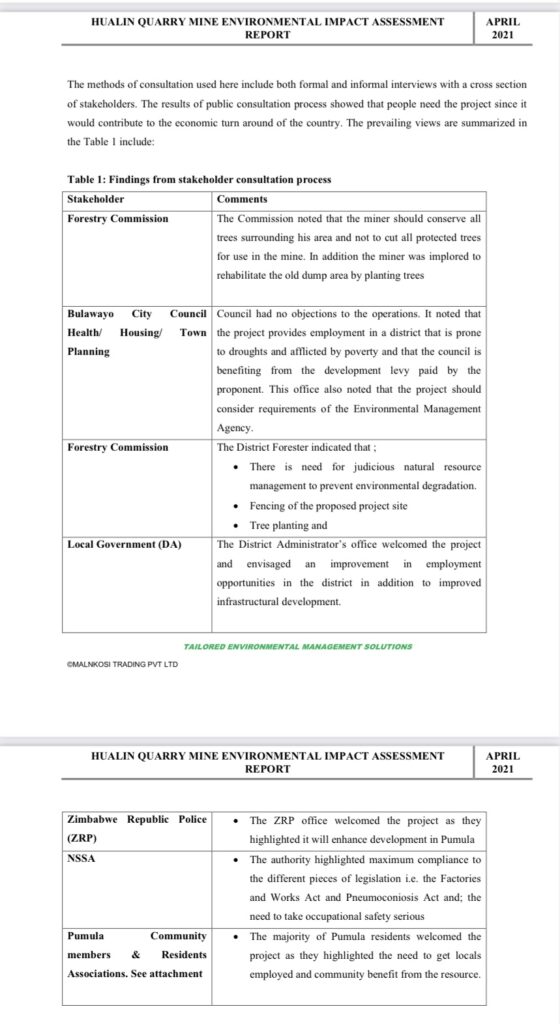
Residents, however, insisted that there were no proper consultations before the quarry mine was set up.
Given Mangena, who is the leader of the Unemployed Patriotic Youth Association leader, said some stakeholders were deliberately excluded after they raised uncomfortable questions about the project.
Mangena said the questions raised via WhatsApp groups centred around concerns over pollution, damage to the environment and employment opportunities for local youths.
“The company said it will not employ people directly but the problem is that we are no longer involved in the process,” he said.
“It seems the company is only working with a certain clique and holding its own caucuses. We once added the Chinese miner to our group where people asked him questions and I was persecuted for allowing such to happen.”
On December 8, 2021, after pressure from the community, Bulawayo Progressive Residents Association (BPRA) organised a meeting with Hualin, Company Director Huang Hua, where the residents aired their grievances.
Haung assured residents that his company would take responsibility for any damages to the environment and properties.
He insisted that the quarry mine met all the legal requirements.
Another meeting was held on December 22, 2021, over the same issue where participants claimed that some of the people that were interviewed for the EIA were paid between US$10 and S$15 to influence the outcome of the study.
“Who was supposed to sign those minutes? Was it the area section leaders or residents associations because we heard that when people were signing, they were given US$10 while there were sentiments that the councillor was given $15 000 and a house is being built for her,” one resident claimed.
The residents also claimed that Huang handed out food donations to some community leaders during EIA study to influence the process.
“Leaders in the community should not use the company as a tool to improve their political mileage, that is wrong, the whole community must benefit,” Ndlovu said.
On December 24, 2021, at another meeting, Ward 17 councillor, Sikhululekile Moyo, said public consultations were held, but they were disrupted by the Covid-19 lockdowns.
“We called representatives of BPRA, the Bulawayo United Residents Association (BURA), Mthwakazi Residents Association and area section leaders including ward committees, who are elected by residents, not me,” Moyo said.
“When they met, they discussed the disadvantages and advantages. Minutes of all the meetings were attached to the documents sent to EMA.”
Moyo said the area where the mine was set up was designated for quarry mining in Bulawayo’s city masterplan.
“It’s not the Chinese who asked for the mine, it was the city council who awarded the mine and approved it by the ministry of mines,” she said.
“There would be other quarry mines in Entumbane, Luveve, Pumula East, Robert Sinyoka, Pumula North.”
Moyo said the council invited bids for the proposed quarry mines in 2017, “no one showed interest” until Hualin came forward.
“An Indian, a local company and another Chinese came forward for other sites,” she added.
“These went through the protocols with EMA and the Ministry of Mines. In 2020, Hualin was advised that the place was theirs and they had to meet with residents in the affected area.
“However, EMA was clear that engagements didn’t stop, people can still write and hand in their reports to EMA. It’s more important to go to EMA than going to a newspaper.”
The councillor also dismissed allegations that she was one of the community leaders, who were allegedly bribed by the Chinese.
“As for the allegations against me, those who are making them can go to the police and I also have the right to go to the police,” she added.
“Let the law take its course.”
Moyo, however, admitted that she received groceries on behalf of residents from Hualin, but did not elaborate on the matter.
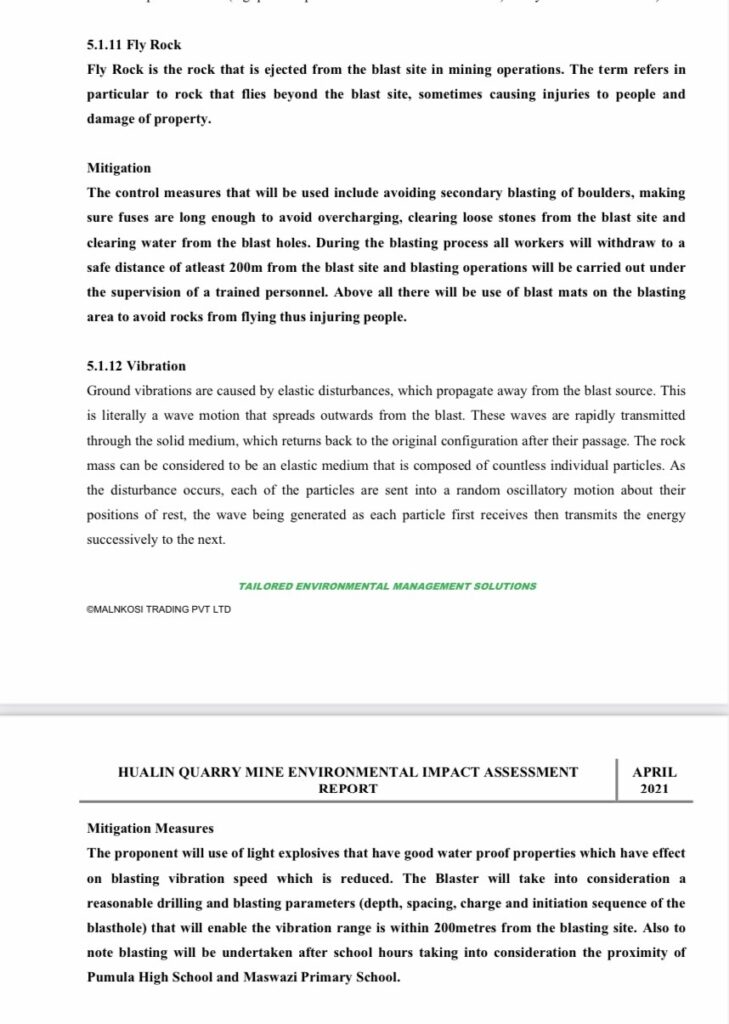
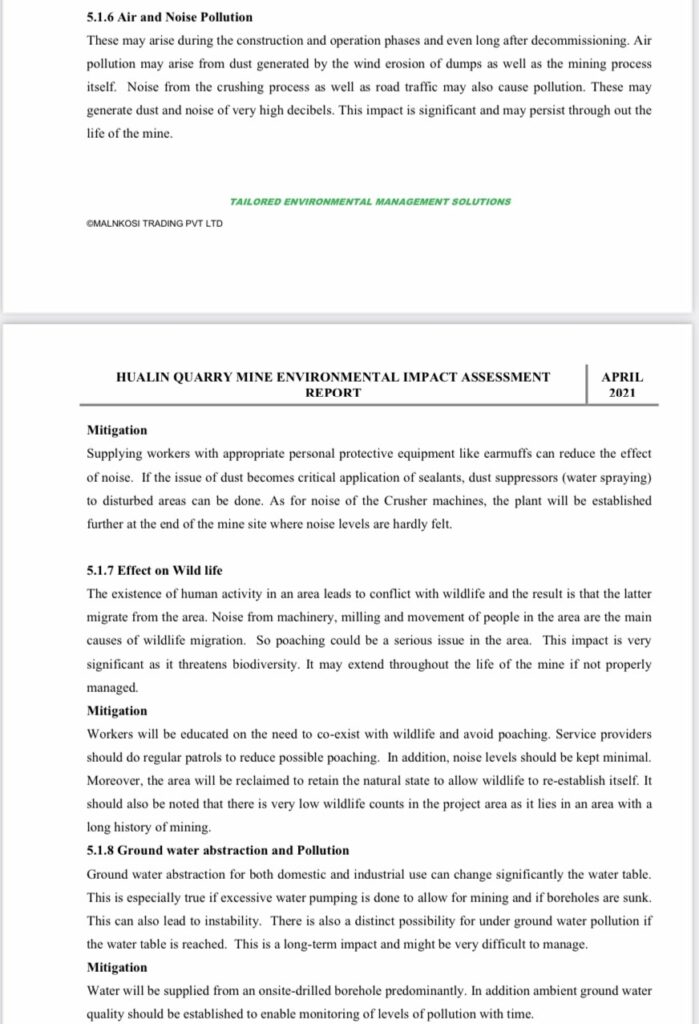
Bulawayo deputy mayor Mlandu Ncube defended the location of the mine in Pumula, saying the zoning was in accordance with the city’s master plan.
“According to our council report, everything was done lawfully. When we advertise and someone shows interest, they follow council procedures and we make a decision on procedures followed,” Ncube said.
“When someone comes in for a project, they must consult residents or a certain number of properties. When those people are consulted, the sender of the information comes back with a response of registered mail and then the council confirms whether these are proper addresses in those areas, which the council did.
“It confirmed the membership that those are people who live there so the consultation was done.”
However, the deputy mayor could also not confirm if the company “bought people or not.”
“We don’t know, we were not there, there’s no one who has proof of this,” he said.
Ncube said the quarry mining venture was creating employment for locals and helping in curbing crime.
“People were now killing each other in that rocky area. We also expect the company to play its part of social responsibility so they will fix that road from Pumula North and Methodist Village,” he said.
“For how long will we sit staring at those rocks, those rocks must bring revenue. If you go now to Robert Sinyoka or Methodist villages –individuals have been poaching sand, until someone’s house sunk into a pit.
“How do you compensate for that? This could have been avoided if there is someone to hold responsible. If a company caused the destruction of that property, we will know who to follow.
“I’m not saying the miner must destroy people’s houses, but if residents say their houses have developed cracks there will be someone who will be held responsible.”
*Not her real name



